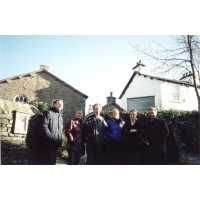New book charts rise in alternative spirituality

Within three decades as many people in Britain will be involved in alternative spiritual practices as in traditional churchgoing, according to a new book by Lancaster University authors.
The book, which is set to cause a stir in the study of religion and contemporary culture, draws on findings from a locality study of religious and spiritual activity in Kendal, Cumbria.
‘The Spiritual Revolution: Why Religion is Giving Way to Spirituality’ by Paul Heelas and Linda Woodhead (Religious Studies) will be published next week.
The research, carried out by full-time researchers Ben Seel and Karin Tusting and directed by Heelas, Woodhead and Bron Szerszynski (Institute for Environment, Philosophy & Public Policy), found that church attendance had been declining rapidly since the sixties. Meanwhile forms of alternative spirituality including Alexander technique, Buddhist groups, herbalism, reiki, tarot card reading and yoga have flourished in the last twenty years.
Relating these findings to wider trends, the authors argue that changes in religious practice reflect a wider flight from deference and a concern with personal experience and growth.
They also reveal a shift in which women come to play more prominent, active and leading roles in defining, channeling and interacting with 'the sacred', a role previously reserved for a male priesthood.
The authors commented: “It was interesting to find that the spirit of the Romantics was still alive and well – in the gateway to the Lakes. The forms of spirituality that are doing best are those which have to do with the cultivation of what Wordsworth called ‘the spirit of life’.”
The findings have attracted the interest of The Westmorland Gazette, Channel 4 (‘Do You Believe in Magic’), the THES and The Times.
Photograph L - R: Benjamin Seel (researcher), Abby Day (assistant), Bron Szerszynski (project leader IEPP), Linda Woodhead (project leader RS), Karin Tusting (research associated), Paul Heelas (project leader, RS)